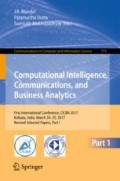Abstract
The modern society, with the advances in wireless sensor network (WSN) technology, are connected in ways more than one. Since the evolution of evolutionary computing and the Internet of Everything (IoE), the term connected has faced a more significant meaning per se. But as the IoE grows, it becomes more complicated and tackling its complications in various aspects of its architecture becomes all the more paramount. This paper aims to resolve some of the issues so faced by the IoE paradigm, with the help of meta-heuristics and to incorporate proper swarm intelligence based routing algorithms to optimize connection issues such as real time delay, network congestion. Fog Computing is used to distribute the workload and to optimize the utilization of bandwidth, which maintains a clean and efficient channel of communication between the IoE clusters and the primary cloud storage. In this approach a new algorithm based on Directed Artificial Bat Algorithm (DABA) is deployed and Particle Swarm Optimization (PSO) meta-heuristics is used to optimize the capabilities of the IoE cluster and maintain its density. The Fog servers, so implemented, grapple with the increased mobility and network usage using the Dynamic Graph Partitioning algorithm.
References
Vecchio, M., Lopez-Valcare, R., Marcelloni, F.: An effective metaheurisic approach to node localization in wireless sensor networks. In: 2011 8th IEEE International Conference on Mobile Ad-Hoc Network and Sensor Systems (2011)
Gol, H.S.: Integration of wireless sensor network (WSN) and internet of things (IOT), investigation of its security challenges and risks. Int. J. Adv. Res. Comput. Sci. Soft. Eng. 6(1), 37–40 (2016)
Lei, L., Zhong, Z., Zheng, K., Chen, J., Meng, H.: Challenges on wireless heterogeneous networks for mobile cloud computing. In: IEEE Wireless Communications, June 2013
Yannuzzi, M., Milito, R., Serral-Gracia, R., Montero, D., Nemirovsky, M.: Key ingredients in an IoT recipe: fog computing, cloud computing, and more fog computing. In: Proceedings of 2014 IEEE 19th International Workshop on Computer Aided Modeling and Design of Communication Links and Networks (CAMAD), December 2014
Bonomi, F., Milito, R., Natarajan, P., Zhu, J.: Fog computing: a platform for internet of things and analytics. In: Bessis, N., Dobre, C. (eds.) Big Data and Internet of Things: A Roadmap for Smart Environments. SCI, vol. 546, pp. 169–186. Springer, Cham (2014). doi:10.1007/978-3-319-05029-4_7
Parpinelli, R.S., Lopes, H.S.: New inspirations in swarm intelligence: a survey. Int. J. Bio-Inspired Comput. 3(1), 1–16 (2011)
Eberhart, R.C., Kennedy, J.: A new optimizer using particles swarm theory. In: Proceedings of Sixth International Symposium on Micro Machine and Human Science, Nagoya, Japan, pp. 39–43 (1995)
Clerc, M., Kennedy, J.: The particle swarm: explosion, stability, and convergence in a multi-dimensional complex space. IEEE Trans. Evolut. Comput. 6, 58–73 (2002)
Rekaby, A.: Directed artificial bat algorithm (DABA)-a new bio-inspired algorithm. In: International Conference on Advances in Computing, Communications and Informatics (ICACCI), August 2013
Meyerhenke, H., Sanders, P., Schulz, C.: Partitioning complex networks via size-constrained clustering. In: Gudmundsson, J., Katajainen, J. (eds.) SEA 2014. LNCS, vol. 8504, pp. 351–363. Springer, Cham (2014). doi:10.1007/978-3-319-07959-2_30
Paul, A.: Graph based M2M optimization in an IoT environment. In: RACS 2013, Montreal, QC, Canada, 1–4 October 2013
Vaquero, L.M., Cuadrado, F.: Adaptive partitioning of large-scale dynamic graphs. In: Proceedings of the 4th Annual Symposium on Cloud Computing, SOCC 2013, October 2013
Varga, A.: The OMNeT++ discrete event simulation system. In: Proceedings of the European Simulation Multiconference, ESM2001, Prague, Czech Republic, 6–9 June 2001
Varga, A., Hornig, R.: An overview of the OMNeT++ simulation environment. In: Proceedings of the 1st International Conference on Simulation Tools and Techniques for Communications, Networks and Systems and Workshops, SimuTools 2008, Marseille, France, 3–7 March 2008
OMNeT++. https://omnetpp.org/
INET framework for the OMNeT++ discrete event simulator. https://github.com/inet-framework/inet
Python 2.7.7 Release. https://www.python.org/download/releases/2.7.7/
Author information
Authors and Affiliations
Corresponding author
Editor information
Editors and Affiliations
Rights and permissions
Copyright information
© 2017 Springer Nature Singapore Pte Ltd.
About this paper
Cite this paper
Nath, S., Seal, A., Banerjee, T., Sarkar, S.K. (2017). Optimization Using Swarm Intelligence and Dynamic Graph Partitioning in IoE Infrastructure: Fog Computing and Cloud Computing. In: Mandal, J., Dutta, P., Mukhopadhyay, S. (eds) Computational Intelligence, Communications, and Business Analytics. CICBA 2017. Communications in Computer and Information Science, vol 775. Springer, Singapore. https://doi.org/10.1007/978-981-10-6427-2_36
Download citation
DOI: https://doi.org/10.1007/978-981-10-6427-2_36
Published:
Publisher Name: Springer, Singapore
Print ISBN: 978-981-10-6426-5
Online ISBN: 978-981-10-6427-2
eBook Packages: Computer ScienceComputer Science (R0)

